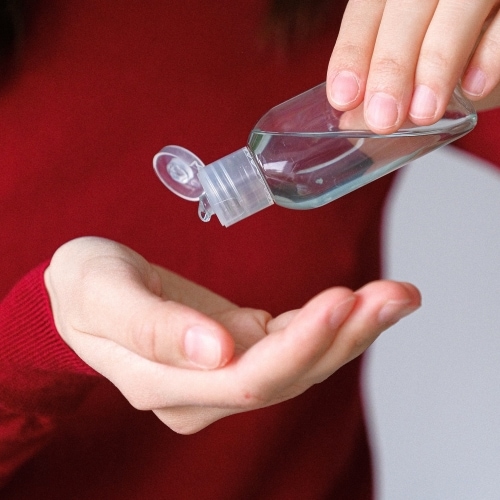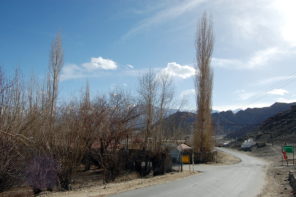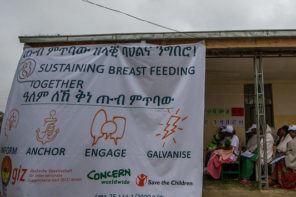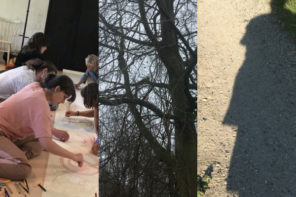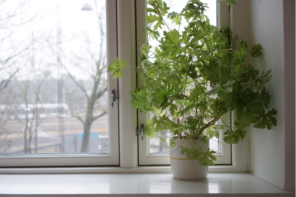This interview with was conducted by was completed and edited between 25 and 29 May, 2020 over e-mail in Berlin.
What is your current research during the Corona pandemic about? What motivated your interest in these questions?
In mid-March, when the shutdowns and travel restrictions in response to the spread of Covid-19 were first issued, I was busy preparing for a longer stint of ethnographic fieldwork in Istanbul, Turkey. Following up on my earlier research on aesthetic body modification and the making of middle-class femininities in Turkey, I was planning to focus on the immense, though neglected role of smell and perfuming in everyday beauty practices. The provisional title of the project was “Olfactories of Beauty”. The idea for my current research began to materialise as I listened to the news from Turkey about panic buyings of Eau de Cologne, which many now started to use as hand sanitizers. At the same time, in preparation of my fieldwork, I was reading anthropological and historical studies on the therapeutic, even medical role of smell. Subsequently, the olfactories of beauty transformed into the olfactories of hygiene. Like Annemarie Mol, who was able to study hygiene and pollution thanks to an earlier and quite open grant that she had, I too was able to adjust my research to the current situation thanks to a Heisenberg Fellowship awarded by the German Research Foundation (DFG).
The aim of “Olfactories of Hygiene” has evolved to seek an analysis of the social, cultural and affective configurations of sanitization and bodily hygiene in relation to smell and olfactory practices. The study of these practices, in particular the use of hand rubs and sanitizers, I hope, may significantly broaden our perspective on and understanding of the current Covid-19 pandemic and crisis, in particular its social and cultural underpinnings.
You say in your project description: “In what ways are the notions of hygiene and sanitations related to sensorial affects, or: does sanitized modernity smell, or is it rather odourless?” Do you have any results yet? To non-social science audiences interested in your work: why does it matter how modernity smells? Could you walk us through this?
Due to the fact that sniffing and smelling have long been considered animalistic and are devalued within the classical hierarchy of the senses, the politics of smell are deeply entangled with the politics and histories of race, class, and gender. Moreover, they are tied to our often tacit assumption of modernity. The relationship between modernism, hygiene and smell is extremely interesting, but has only rarely been studied. During the late 18th and the entire 19th century, social and medical reformers, who from the 1830s formed the so-called hygiene movement, but also scientists, urban planners and artists were obsessed with smell. In “The Foul and the Fragrant” Alain Corbin (1986) describes how in 1790, shortly after the storming of the Bastille, scientists in Paris were sent out by the Société Royale de Médecins to explore the odors of the riverbanks, to ‘sniff them out,’ as Corbin writes, in an attempt to monitor the health and sanitary situation. While germ theory and Pasteurism in the late 19th century forever changed our assumptions and practices of hygiene, not least in relation to smell, European modernists until well into the 20th century were driven by the desire to create odourless cities with airy boulevards, panoramic vistas and smooth and shiny surfaces. In his analysis of the “smelly immigrant” trope, Martin Manalansan calls odorlessness the basic ‘utopic myth’ of the modern city. Perhaps one could say that modernism –itself an aesthetic practice and affective desire– was born out of the olfactory anxieties and vigilance that resulted from the stink of larger European cities in the 18th century, above all of Paris.
Due to the fact that sniffing and smelling have long been considered animalistic and are devalued within the classical hierarchy of the senses, the politics of smell are deeply entangled with the politics and histories of race, class, and gender.
Colonial “modernisers” then set out to not only rule, but also, to polish and deodorise other parts of the world, a practice that gained momentum in times of epidemics. From historian Robert Peckham’s study on the draconian colonial “cleansing” policies in Hong Kong during the Third Plague Pandemic in the 1890s, one gets a sense of how strongly smell figured in the colonial attempt to control the pandemic. Reports regularly mention nauseating “Chinese” odors and poorer districts in particular were described as saturated with a “noisome and noxious” atmosphere. In order to fight these malodors, seen as leading to and emanating from sick bodies, infantry troops were sent in large numbers to disinfect or simply to burn people’s belongings. When I see images of spray machines disinfecting poorer residential areas and streets in Hong Kong and other Asian cities these days, I have to think of this history of violence, which obviously continues to haunt these places…
If we look at Turkey and Germany today –the two places that my research most closely relates to– we can see that the idea of an odorless modernity continues to affect and guide us. For example, until recently, Eau de Cologne, Kölnisch Wasser in German, was considered a thing of the past among younger urbanites, something one’s grandmother might continue to use. As mentioned above, due to the shortage of non-perfumed, ‘medical’ hand rub, this has recently been changing in Turkey. In addition, what I find interesting is that while ‘medical’ hand rubs are not commonly associated with any smell, they do in fact smell, often acrid, alcoholic or chlorine…
“Due to the global outbreak of COVID-19 practices of bodily hygiene, cleanliness and sanitation have achieved new meanings in their everyday uses.” What are these new meanings and uses, and what are their consequences? Who has to bear them?
In the current pandemic all of us are called upon to radically change our hygienic and bodily behaviour to stop the spread of the coronavirus, that is, to practice social distancing (or rather, as many have poignantly emphasized, physical distancing), refrain from touching our eyes, nose and mouth, wear facials masks and sometimes, gloves, and wash or clean our hands for at least 30 seconds with soap or hand rub. Now, you might say that even before, most people used to wash their hands after using the toilet. But according to what I gather from an online survey and interviews, the time and efforts devoted to cleaning one’s hands and also one’s house, for example, have significantly increased in response to these calls and in fear of the virus.
What I think is even more significant is the epidemiological and political significance that these seemingly banal everyday practices have suddenly been afforded. Political authorities and global organizations like the World Health Organisation (WHO) tell us that by staying at home and following these safety precautions, we can change the course of history. Just think of how absurd the fact that the President of the European Commission, Ursula von der Leyen, shares a video of herself washing her hands for more than 30 seconds while humming the anthem of the European Union, or the fact that the German chancellor talks about the best way to disinfect one’s facial mask (by ironing), would have appeared to us before March 2020.
Political authorities and global organizations like the World Health Organisation (WHO) tell us that by staying at home and following these safety precautions, we can change the course of history.
While some of these bodily practices, such as the use of hand rub or sanitizers or of facial masks in everyday life are newly adopted, others, such as shaking hands, are discontinued. All of these bodily practices have always been changing and are tied to ongoing, yet particular histories of social encounters (who extends one’s hand to whom, or who is obliged to kiss whose hand), but what strikes me as an anthropologist studying such practices is to see how sudden and radical these changes took shape. Greeting rituals like the handshake, I’ve been teaching in my Anthropology of the Body class for many years, are highly formalised and habituated, ingrained in our bodily hexis, so to speak. Even if shaking hands, at least in Germany, was no longer the standard technique of greeting –even before the spread of Covid-19– it was nevertheless indispensable for negotiating particular social interactions –when being introduced to someone new, or upon confirming a business deal, for example. It is (or should I say ‘was’?) embedded in particular moral and symbolic cosmologies (one extends and shakes one’s right hand, as Robert Hertz pointed out in his essay on the pre-eminence of the right hand), and upon refusal, is –or used to be– rather effective in its humiliating effects (just think of the Prime Minister of Thuringia, Bodo Ramelow, refusing to shake hands with Björn Höcke, the leader of a far-right extremist organisation within the right-wing populist party Alternative for Germany, AfD, upon his installation into office in early March).
Don’t get me wrong, I’m not waxing sentimental about the end of the handshake here. Infectious diseases doctors have long warned that the handshake poses a serious health hazard and is one of the great causes for the spread of viruses. However, to repeat, when we look at the handshake, the sudden and radical changes in meaning of this bodily technique during the current pandemic comes into sight. Also, how quickly scientific knowledge on germs and viruses, infections and epidemics became common knowledge, in a popular process of becoming literate, so to speak! Thus, when right-wing populists like US President Donald Trump, Brazil’s President Jair Bolsonaro or the British Prime Minister Boris Johnson continued to publicly shake hands or refused to wear masks well after many of their citizens had started to take the safety precautions recommended by the WHO, this was readily understood as a political act. With fatal consequences, as we can now see…
Which research methods have you been using for your work? What are some challenges you have encountered? How did you overcome them?
Due to ongoing travel restrictions, classical fieldwork, in my case to Istanbul, is currently out of the question. Instead, I opted for a combination of participant observation in Berlin and a couple of virtual and online tools, inspired by some of the entries in the crowdsourced document on “Doing fieldwork in a pandemic” linked to the American Anthropological Association’s website on COVID-19 Resources. For example, I set up a bilingual online survey (not least, to get in touch with people ready to conduct a subsequent video interview), asked a number of acquaintances, friends and relatives in both Turkey and Germany to keep hygiene- and smell-related diaries, and attempt to do some kind of participant observation in social media such as facebook, youtube, and twitter. Not least, I’ve embarked on a journey of auto-ethnography, talking to family members about different smell-related encounters and memories. So far, this has been really interesting and enriching. Even though I spent most of my adult life in Germany, I’ve never conducted fieldwork here!
Moreover, with partial lockdowns and restrictions of movement in place in Turkey and elsewhere, I noted that many people now document even the most trivial details of their intimate everyday lives with their smartphones, uploading the resulting videos to youtube or facebook. For example, I’ve tracked the hashtag #kolonya, Turkish for Eau de Cologne, to see how people came to make use of kolonya, traditionally used in an everyday gesture of welcome and as a sign of hospitality during the holiday of Eid al-Fitr, Ramazan Bayramı in Turkish. As you can see from a resulting blog post, I’ve learnt a lot from these postings and videos. This kind of virtual ethnography, at least in my case, rests on the fact that I’ve been to Turkey before and that I’m in constant touch with friends and relatives there. It would be much more difficult if I had been planning to embark on a first-time research, as part of a PhD, for example. Indeed, I feel with the many PhD students, whose research plans and indeed, whose academic careers, are currently on hold and in the long run much more severely affected than mine. The only way to mitigate the long-term effects of this is to make a collective effort, act in solidarity with young researchers, who are even more precarious these days, and perhaps even rethink the value and idea of fieldwork itself. I think this is indeed a good time to rethink the classical form of fieldwork ‘elsewhere,’ in favour of more collaborative and decolonial encounters, taking into account the relationality of different ‘heres’ and ‘theres’. As Ruth J. Prince recently put it in a moving essay about the experience of doing and discontinuing fieldwork in Kenya during the outbreak of the epidemic and taking one of the last return flights ‘home,’ ‘our detached and benevolent claim to ethnographic participant observation, always from a position of privilege and relative security, is put into question at precisely the moment when true participation finally becomes inevitable.’
I think this is indeed a good time to rethink the classical form of fieldwork ‘elsewhere,’ in favour of more collaborative and decolonial encounters, taking into account the relationality of different ‘heres’ and ‘theres’
To sum up, I’m not sure whether I’m managing to overcome the challenges that the spread of Covid-19 and the resulting regulations have posed for my research and also for my everyday life more generally. Like most things these days, this is an open-ended experiment and work in progress. And while for me, the past few months have indeed been a time of creativity and learning, I recognise that my own situation is rather privileged. (Apart from struggling with a lack of childcare and homeschooling my daughter, which has been truly dreadful at times!)
Given your specific focus on the intersections of the body, political economy, and gender, what are some questions which have surfaced through your work (past and present) which might inform our praxis during this pandemic?
In an earlier research, I focused on the devaluation and feminization of care workers, which I think have become both very visible, but are also exacerbated in the current situation. Thus, I wrote my PhD on migrant care workers from the Philippines, who as the largest group of migrant nannies, caregivers and nurses around the globe are on the frontlines of virus exposure and care-taking. Moreover, the devaluation and feminization of care work holds true for both paid service work as well as for an ongoing gendered division of labour within private households and families. Take for example the warning of academic publishers that the gender gap in academia is carried to an extreme in the current situation, with many male researchers obviously experiencing a creative boost, whereas female researchers are hindered in their work and overburdened with childcare responsibilities, suffering from the effects of closed kindergartens and schools.
Questions of touch and intimacy that I’ve been looking at in both my research on care work and, more recently, beauty service work, are of course very pertinent in the current situation, becoming increasingly digital on the one hand and rendered illegitimate and suspicious on the other. Ursula Probst and Max Schnepf have recently produced a thought-provoking reflection on the current digitalization and transformation of intimacy, Thinking Sex in Times of Corona, forthcoming in Somatosphere. What I find important to remember is that the digitalization of intimacy does not necessarily imply disembodiment. However, it certainly goes along with a sensory reduction –just think of smell!– along with a strengthening of the visual. This dominance of the visual in social media such as instagram or dating platforms, especially in regard to body images, poses great risks. Thus, we certainly need more studies on how highly mediated, cosmetically altered body images affect (younger) people’s subjectivities and bodily practices, especially when they are confronted with a plethora of these images at home alone.
Given the imminent climate catastrophe and the digitalisation of our everyday lives, we live through a truly posthumanist moment.
On a more conceptual level, I find that the current pandemic really shows the relevance of the work done on multispecies coexistence, relational anthropology and posthuman subjectivities. In particular, it shows the interrelatedness and relationality of our bodies, or rather, of embodied matter. Given the imminent climate catastrophe and the digitalisation of our everyday lives, we live through a truly posthumanist moment. I’m a long-standing fan of feminist science and technology scholars and new materialists such as Donna Haraway, Anna Tsing and Rosie Braidotti and hope to be able to make more use of their conceptual outlines in my future work.
Given that bodies are the sites of biopolitics – what are some reflections on the biopolitics of pandemics given your research and own experience living in Berlin, Germany through this pandemic?
The notion of biopolitics helped Michel Foucault to describe how, during the 19th century, populations were increasingly measured and ordered into distinct categories to become better manageable, with important effects on the subjects’ sense of the self. It proves extremely helpful to understand how ideas of the standard, the average and the normal continue to affect and indeed shape our material selves, in terms of both bodily substance and subjectivity. However, a concept that I find even more helpful for making sense of the current situation is ‘microbiopolitics,’ coined by Heather Paxson in her anthropological research on raw-milk cheese in the US to describe how the ‘dissent over how to live with microorganisms reflects disagreement about how humans ought to live with one another’ (2008: 16). The notion builds on the important work of Bruno Latour, especially his Pasteurization of France (1988) where he describes how the Pasteurians, in relation with the hygienic movement transformed microbiology into what he calls a complete science and in consequence made sanitization indispensable. When Latour describes Pasteur as a researcher ‘who was able to interest a large educated public in the well-nigh daily drama of his experiments’ (1988: 86), I cannot help but think of the virologist Christian Drosten, whose podcast is regularly quoted in my conversations with friends and neighbours, for example, when we discuss whether we should allow our children to play together in the backyard.
Not least, the notion of post-Pasteurian microbiopolitics, which the Pasteurians, according to Paxson, regard as irrational risk behaviour but the post-Pasteurian raw-milk cheese producers themselves understand as a resistant move beyond antiseptic attitudes, helps me to think through the political debates around the Covid-19 regulations in Germany these days. While I can sympathise with Paxson’s cheese producers, being myself a great fan of raw milk cheese, I am alarmed by the emergence of so-called “hygiene demos” in Berlin and other cities in Germany, whose anti-vaxxing supporters could certainly be described as post-Pasteurians. While the protesters refer to ‘hygiene’ to protest the government’s hygiene restrictions, their use of the term in combination with their iconography brings to mind European fascism’s and German Nazism’s use of the term. Thus, when I hear these people talk about a second holocaust (because the government allegedly threatens to enforce mass vaccinations against Covid-19), wearing T-shirts and masks with yellow patches like Jews were forced to wear them during the Nazi regime, also publishing a poster of Christian Drosten next to the infamous Nazi physician Joseph Mengele, for me, as the granddaughter of a Jewish survivor of the Holocaust, this is deeply disconcerting.
I am alarmed by the emergence of so-called “hygiene demos” in Berlin and other cities in Germany, whose anti-vaxxing supporters could certainly be described as post-Pasteurians.
Apart from the fact that I feel sorry for Drosten and the many other scientists and politicians who see themselves confronted with threats and hate campaigns these days, I’m bewildered by the abuse of Jewish suffering and the holocaust that this rhetoric and iconography entails. The rise in anti-Semitism, conspiracy theories and more generally a politics of resentment have already become palpable.
When in early April I posed the question –in my website description of Olfactories of Hygiene– whether ‘post-Pasteurianism’ would survive the COVID-19 pandemics, the ‘post-Pasteurian’ mass demonstrations in the name of (anti-)hygiene were not yet existent. It’s weird, and I have to say deeply disconcerting, to see one’s research questions being answered so promptly and taken into such unanticipated directions by social reality.
What would you urge young anthropologists to do in terms of research (bachelor’s thesis, short-term ethnography etc.) in these times?
For me personally, writing a Corona diary, engaging in virtual ethnography as well as in auto-ethnography have been really helpful and productive in the past few weeks and months. There lies an immense potentiality in virtual ethnography, which we (or should I say I?) are only just beginning to explore. For example, I’m currently supervising a very promising Bachelor student, who conducts research on a sex robot App, creating and then interviewing her own avatar to think about questions of gender, posthumanist subjectivity and co-existence.
While some might find it helpful to read into the history of epidemics, microbiopolitics or hygiene to make sense of the current moment, others may feel an urge to stay away from these themes, which are now so much part of our everyday lives. Most of all, I think that the curiosity, attentiveness and ability to listen to other people demanded of any good fieldworker are really important these days. Now is the perfect time to train these skills!
What are some blogs, podcasts, or portals you recommend for people interested in following your work and work on related topics?
The sheer amount of anthropological blogs, podcasts and portals that are being published on Covid-19 alone these days is simply breathtaking. The online journal and collaborative website Somatosphere has been compiling a series called Medical Anthropology Weekly on Covid-19, with a large collection of texts, audio and video materials within, but also beyond Medical Anthropology. I’m doing my best to scan through this weekly compilation and read or watch whatever catches my interest. Within German speaking social and cultural anthropology, I follow the boasblogs as well as the blog of the German Anthropology Association’s, the DGSKA’s, working group Medical Anthropology/Medizinethnologie. The newly founded DGSKA working group that I’m part of, “Gender & Sexualities | Queer Anthropology,” does not have its own blog yet, but a mailing list as well as a facebook group. And of course, I would like to invite everyone interested in finding out more about my own research project to visit my new research blog on the Cultures of Hygiene.
References
Corbin, Alain 1986. The Foul and the Fragnant: Odor and the French Social Imagination. Leamington Spa, Hamburg, New York: Berg.
Latour, Bruno 1988. The Pasteurization of France. Cambridge, MA and London: Harvard University Press.
Manalansan IV, Martin F. 2006. ‘Immigrant Lives and the Politics of Olfaction in the Global City,’ in J. Drobnick (ed.), The Smell Culture Reader. Oxford, New York: Berg, pp. 41–52.
Paxson, Heather 2008. ‘Post-Pasteurian Cultures: The Microbiopolitics of Raw-Milk Cheese in the United States.’ Cultural Anthropology, 23(1): 15–47.
Peckham, Robert 2016. ‘Hong Kong Junk: Plague and the Economy of Chinese Things.’ Bulletin of the History of Medicine, 90(1): 32–60.
Featured image by Anna Shvets (Courtesy of pexels.com)

